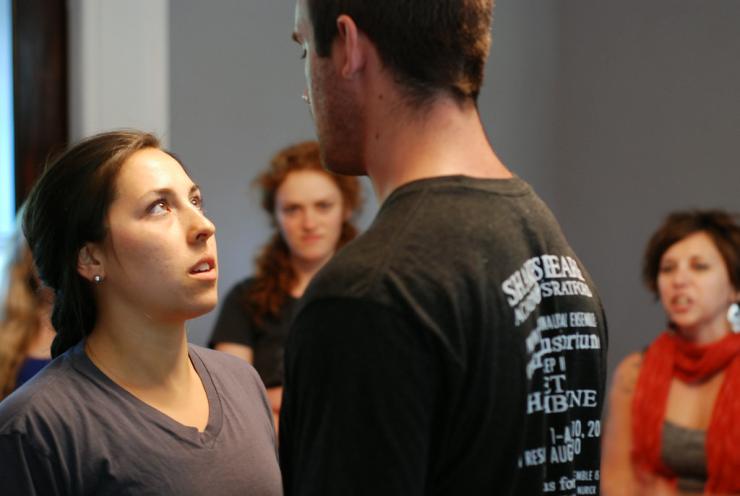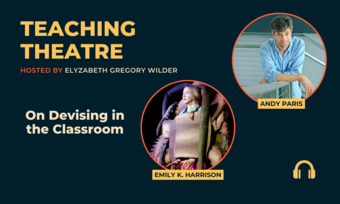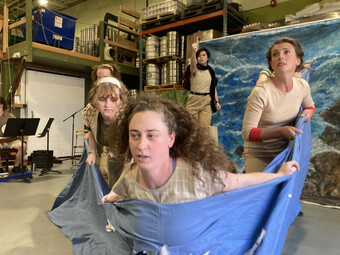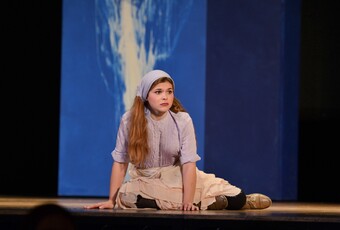Your Guide to Theatre Education
Shakespeare Academy at Stratford
In this series, David Dudley looks at the different models of theatre education around the country through interviews, with the hopes that a new student will have an easier time finding the model that works for them.
Colleen Sullivan is a director and educator based in New York City. She is also the Artistic and Program Director at the newly founded Shakespeare Academy at Stratford—which announced its inaugural season on July 1, 2014—in Stratford, Connecticut. Ms. Sullivan has directed a number of Shakespeare's plays, and has recently been focusing on new play development with Ensemble Studio Theatre. Ms. Sullivan holds an MFA from Sarah Lawrence College, and an MLitt in Shakespeare and Performance from Mary Baldwin College, in partnership with the American Shakespeare Center.
When was the Shakespeare Academy at Stratford (SA@S) started? When did you join?
Shakespeare Academy @ Stratford was conceived of in 2013 and the first ensemble arrived in July 2014. I was hired by the Mighty Quinn Foundation in January 2014 to create and run the program to launch summer 2014. SA@S is located on the grounds of the former American Shakespeare Festival Theatre and Academy in Stratford, CT, which began in the 1950s. The theatre has been shuttered since the 1980s and the original academy closed long before that.
What does SA@S' program offer potential students?
The opportunity to create theatre as an ensemble, intensive study of both Shakespeare's text and ensemble theatremaking, plus master classes from visiting artists and teachers in areas that inform and influence the students’ performances—like voice, devising, movement, directing, Alexander technique, Shakespeare scholarship, and combat. Students live together, work together, eat together, and form an ensemble.

What makes SA@S' program different from others?
The combination of Shakespeare training with contemporary ensemble theatremaking—the work emphasizes both the text and physical elements. Also, working site-specifically, creating performances as an ensemble under the direction of professional directors, and the opportunity for college students to perform two Shakespeare productions in rotating repertory.
We get one show up on one day, and the very next day they open the other show, in a different site-specific location. Actors learn all of their lines before they arrive for the summer, and they run both shows, on their feet, off-book at the first rehearsal.
Putting up two Shakespeare plays in five weeks of rehearsal with two different directors and a full slate of classes—that’s pretty ambitious. Or so we were told many times. We embrace the fun and delight in the privilege of making theatre every single day.
What are the guiding principles of the program?
It’s Not About You: Someone says this pretty much every day, with a big heart and in good spirit. It’s the philosophy of our ensemble work. It’s not about you, it’s about everything else: the play, each other, the group, the space, the history, the audience…it’s a generous and gracious way to work.
Relentless Forward Motion: Keep moving forward. Keep moving. Adapt and move on. We don’t spend a lot of time lingering and discussing and deliberating. We listen to instinct and try things. See where they lead, where our curiosity takes us.
Work Hard, Play Hard: Putting up two Shakespeare plays in five weeks of rehearsal with two different directors and a full slate of classes—that’s pretty ambitious. Or so we were told many times. We embrace the fun and delight in the privilege of making theatre every single day.
Following that, what's working?
Based on our inaugural ensemble and how we are all in touch on a regular basis, the emphasis on the ensemble is absolutely working. We put the creation, care, and nurturing of the ensemble above everything else.
What kinds of challenges have you faced? How do you intend to approach them in future?
Because we are a new program and not tied to a particular theatre or existing program, getting the word out about us has been a challenge. We are learning better where to let people know about our existence. And now our alumni are happily willing to help us market the program. We are a small staff, funded and founded by a charitable organization, so we all do lots of different things, which can be challenging to keep up with, but we’re figuring that out, too. We developed all of our materials in house, from the logo to the website to the marketing materials. We are devoted to continuing our relationships with all of our alumni, researching relationships, grants, etc.—things like that take a lot of time, so just determining how to spread out our personnel resources and how to efficiently work remotely in the off-season.
What's missing, in your opinion, from the current education/ training programs available?
As David Neumann, our master class teacher in movement said about SA@S: “We need this type of training and this type of theatre. A chance to be rigorous and creatively open all at once.” I think that’s a void we fill. Students are given tools and training to learn to be creatively open. It’s about training young theatre artists as theatremakers. And simultaneously giving them the opportunity to put that training into practice by creating two Shakespeare productions. Often training/education programs are separate, or there is a distance between the training and the performing.
Who do you feel is the ideal candidate? Who are you trying to bring into the SA@S family?
The first question we ask on our application has to do with the emphasis on ensemble. So we ask students to write about a time you were part of a sustained ensemble experience and what that meant to them. We are looking for candidates who are mature, nice, generous, adventure-lovers, risk-taking, fascinated by the creative process, positive, curious, and in it for the team.
Any changes planned for the future?
This summer we are bringing back four alumni to help run the program in various capacities, and in turn for their service we will house them and help them produce a Shakespeare production of their own. They cast, cut, help with the budget, rehearse, direct, and act in the show as an independent ensemble. And then we’ll tour it around Stratford and at the Academy before the current students’ season begins.
We are also adding some different master classes, experimenting with rotating some old classes with new ones. I’m really committed to offering courses in contemporary ensemble theatremaking.
We are also offering opportunities for one student per show to work on the design of the show they are not acting in.









Comments
The article is just the start of the conversation—we want to know what you think about this subject, too! HowlRound is a space for knowledge-sharing, and we welcome spirited, thoughtful, and on-topic dialogue. Find our full comments policy here